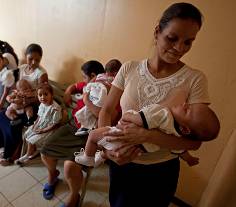Investment in global health is best way to save lives, say Bill and Melinda Gates
30 October 2009
In speech to US policymakers this week, Bill and Melinda Gates called for a global push to halve child deaths worldwide by 2025 .
In a joint speech Bill and Melinda Gates made the case that US initiatives to fight AIDS, malaria, and other diseases in poor countries are "America's best investment for saving lives," and that continued support could help cut child deaths in half worldwide in just 15 years.
The Gateses, co-chairs of the Bill & Melinda Gates Foundation addressed an audience of lawmakers, administration officials, and foreign policy experts at Sidney Harman Hall in Washington, DC.
 "Dollar
for dollar, global health is America's best investment for saving
lives," said Bill Gates. "US-supported global health programs are saving
and improving the lives of millions of people, at a remarkably low cost.
All Americans should be proud of this success."
"Dollar
for dollar, global health is America's best investment for saving
lives," said Bill Gates. "US-supported global health programs are saving
and improving the lives of millions of people, at a remarkably low cost.
All Americans should be proud of this success."
"In our visits to developing countries, Bill and I have met countless people who are alive, healthy, and productive as a result of US global health programs," said Melinda French Gates. "We want Americans to know how much their generosity is accomplishing, and how much it's appreciated."
While spending on global health makes up less than one quarter of one percent of the federal budget, it has increased significantly in recent years — from $1.5 billion in 2001 to $7.7 billion in 2009. These investments are achieving impressive results; for example:
- The President's Emergency Plan for AIDS Relief (PEPFAR), launched in 2003, has helped to save an estimated 1.2 million lives by expanding access to HIV prevention and treatment.
- The Global Fund to Fight AIDS, TB, and Malaria, supported by the U.S. and other donors, has provided 88 million insecticide-treated bed nets to protect children from malaria.
- In less than a decade, the GAVI Alliance — a global
initiative to
immunize children in poor countries — has already prevented an
estimated 3.4 million deaths.
While recent progress in global health is encouraging, the Gateses will emphasize that it is only a starting point.
"When it comes to global health, Bill and I are optimists — but we're impatient optimists," said Melinda Gates. "The world is getting better, but it's not getting better for everyone, and it's not getting better fast enough."
Call for rapid action to cut child deaths in half
The Gateses urged policymakers to commit to reducing child deaths worldwide by nearly 50% — from approximately nine million per year at present to five million by 2025.
"US support has already helped to reduce deaths of young children by more than 50% in the past 50 years. If we keep up our commitment, it's possible to cut child mortality in half again — just 15 years from now," said Bill Gates. "What's more, we can do it with proven interventions that already exist."
 |
 |
| Campesinos, the local cattle men, use their horses to deliver the Rotavirus vaccine to rural communities in the northern highlands to areas inaccessible to vehicles. Corozal, Nicaragua. July 21, 2009. Photo courtesy of the Bill & Melinda Gates Foundation / Brent Stirton | A mother holds her two-month-old baby in the crowded waiting room of a government health clinic. She and the other mothers are waiting for their children to receive the Rotavirus vaccine. More than 80 percent of children in Nicaragua have been vaccinated against this life-threatening gastrointestinal disease. Pantasma, Nicaragua. July 21, 2009. Photo courtesy of the Bill & Melinda Gates Foundation / Brent Stirton |
Citing new projections by researchers at Johns Hopkins University, the Gateses highlighted four key strategies that could be combined to achieve this dramatic reduction in child mortality:
- Vaccines: Immunizing 90% of children with vaccines to
prevent
rotavirus, pneumococcal disease, measles, and other illnesses; - Fighting malaria: Reaching 90% of people at risk with bed nets and other malaria prevention tools, and providing effective malaria drugs to 75% of those in need;
- Maternal and newborn care: Providing basic health services to at least 75% of pregnant women and newborns ;
- Treating diarrhoea and pneumonia: Ensuring that at least 75% of children receive treatment for diarrhoea and pneumonia, including antibiotics for bacterial infections.
Researchers also estimate that implementing these strategies would reduce the number of women who die in pregnancy and childbirth by approximately one-third.
"These are ambitious goals — but we can achieve them, if we keep investing in global health and expand programs that work," said Bill Gates. "If we succeed, millions more children will have the opportunity for a healthy and productive life."